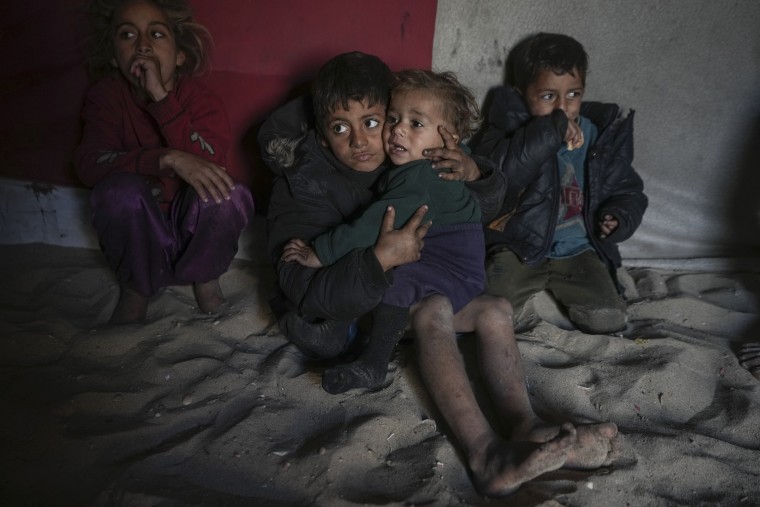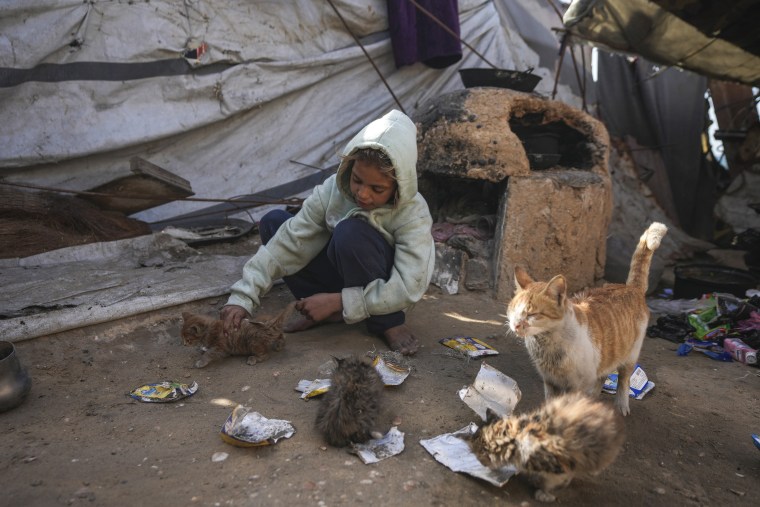-
Dillon Gabriel’s mentorship has Dante Moore poised to be next great Oregon QB - 2 mins ago
-
Taiwan president welcomes exchanges with China as Xi says no one can stop ‘reunification’ - 16 mins ago
-
A Rolls-Royce, a monkey in a onesie and weed: CHP makes unusual stop - 26 mins ago
-
Mortifying Moment Woman Realizes People Can Hear What She Listens to in Car - 32 mins ago
-
12 must-have apps to crush your New Year’s resolutions - 35 mins ago
-
Cowboys release Ezekiel Elliott in hopes RB can land with playoff team - 47 mins ago
-
Diplo Announces He is ‘Tripping’ on LSD During CNN New Year’s Live - about 1 hour ago
-
New Year food and drink trends include cocoa, flowers and one type of beer - about 1 hour ago
-
Can the Detroit Lions offense propel them to a deep playoff run this year? | Speak - 2 hours ago
-
Ford recalls nearly 300,000 F-Series trucks over defective fuel pumps - 2 hours ago
Gaza’s babies struggle to cope with plummeting temperatures
Seela al-Faseeh was only two weeks old when her father, Mahmoud al-Faseeh, 31, said he took her from their makeshift tent near Khan Younis to the pediatric emergency ward at Nasser Hospital on Wednesday, shortly after her body turned blue and stiff.
“We woke up to find the girl like wood,” Faseeh told NBC News.
When doctors examined the baby, they found no health problems or congenital issues. Instead, they said, her heart had stopped beating because of the temperature plummeting during the night.
She was born amid the war, Faseeh said, but she died because of the cold.
Ahmed al-Farra, director of the hospital’s pediatric ward, confirmed to NBC News that Seela had died from hypothermia, a medical emergency that occurs when the body’s temperature drops to dangerously low levels. Dying from hypothermia could take hours or days, with babies and children especially vulnerable.
He added that he is tending to such cases daily, with at least four babies dying from the bitter cold in Gaza in the past week.
“Every day, we have two to three cases of hypothermia,” he said. “This is catastrophic and a disaster.”
So far, United Nations estimates that more than 14,500 children have been killed over 14 months, with thousands more injured.
That rate, Philippe Lazzarini, head of the U.N. Agency for Palestinian Refugees, said on Tuesday meant that one child in Gaza is killed every hour.
As a harsh winter sets in across the besieged territory, temperatures in southern Gaza have dropped especially low at night, with most Palestinians in displaced tents unable to find ways to stay warm in the cold, wind and rain.
“Cold injuries, such as frostbite and hypothermia, pose grave risks to young children in tents and other makeshift shelters that are ill-equipped for freezing weather,” Edouard Beigbeder, UNICEF’s regional director for the Middle East said in a statement on Wednesday.
“With temperatures expected to drop further in the coming days, it is tragically foreseeable that more children’s lives will be lost to the inhumane conditions they are enduring, which offer no protection from the cold,” he added.

Beigbeder said that aid workers’ ability to provide essential winter protection like blankets, warm clothing, and other emergency supplies are severely restricted by the limited humanitarian aid Israeli authorities are allowing into Gaza.
On Friday, Lazzarini said that blankets and other winter supplies “have been stuck in the region for months waiting for approval to get into Gaza.”
In a post on X, COGAT, Israel’s military liaison with the Palestinians, said Sunday that over the past 3 months, the agency had facilitated the entry of 9,300 tons of winter related items into Gaza, for a total of 24,000 tons of winter supplies since the start of the war.
Mahmoud Faseeh described his family’s situation as “harsh” in the sands of al-Mawasi, once a seaside village along southern Gaza’s Mediterranean coast, that has since become a crowded tent camp for hundreds of thousands of the enclave’s displaced people.
“We sleep on the sand without any covers, and the tent does not protect us from the cold and chill,” he said. “I don’t know what to say. It’s a very tragic life, exhaustion, and the children are constantly sick due to the cold and the effects of the war.”
Ahmad al-Zahrani, a nurse working at Al-Aqsa Martyrs Hospital, is among those who have died from the cold weather in recent days.
His body was found inside a tent in al-Mawasi on Friday, the Palestinian Health Ministry said in a statement confirming his death. “Ahmad al-Zahrani has passed away due to the severe cold that the residents of the Gaza Strip are experiencing.”

“This incident comes amidst the difficult humanitarian conditions faced by displaced citizens, as the suffering of Gaza’s residents increases due to falling temperatures and a lack of heating resources in the tents,” it continued.
The war that followed the Oct. 7, 2023, Hamas terror attacks that Israeli officials say killed 1,200 people in southern Israel, has decimated Gaza.
Israeli forces have since killed some 45,000 Palestinians, according to local health officials, and destroyed much of the enclave’s basic infrastructure and health system.
This week, UNICEF issued a stark warning against the war’s disproportionate impact on Gaza’s children, especially during the winter.
“Winter has now descended on Gaza. Children are cold, wet, and barefoot. Many still wear summer clothes. With cooking gas gone, many are searching through rubble for scraps of plastic to burn,” Rosalia Bollen, UNICEF’s communication specialist, said during a press briefing in Geneva.
Source link






























